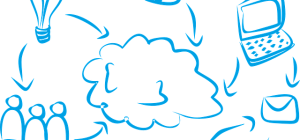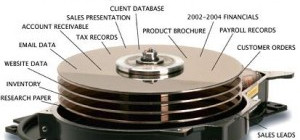 WordPress is one of the most popular content management systems in the world. The platform holds more than 60% of the CMS market share, with over 30% of all websites on the web using the CMS. It should come as no surprise then, that the platform is heavily targeted by hackers looking to steal customer data, personal information, or simply wreak havoc on the backend. We’ve created this guide of the top 5 WordPress security strategies (and how to implement them) to help you secure your website from future attacks. Whether you’re a web design company creating WordPress sites for your clients, or you operate your own site, use the tips below to learn how to properly protect your site.
WordPress is one of the most popular content management systems in the world. The platform holds more than 60% of the CMS market share, with over 30% of all websites on the web using the CMS. It should come as no surprise then, that the platform is heavily targeted by hackers looking to steal customer data, personal information, or simply wreak havoc on the backend. We’ve created this guide of the top 5 WordPress security strategies (and how to implement them) to help you secure your website from future attacks. Whether you’re a web design company creating WordPress sites for your clients, or you operate your own site, use the tips below to learn how to properly protect your site.
- Brute-Force Logins
If you’ve ever operated a WordPress site, you’ve probably experienced this extremely common attack. It’s simple and doesn’t require advanced technical skills, but it’s also effective. The attacker will use an automated script to exploit weak login credentials, with the end goal being to gain access to the backend of your site.
How to Protect Against Brute-Force Logins
It’s very convenient to choose a weak password/username when creating your website. But that’s exactly what hackers who use brute-force scripts are hoping for. It’s essential to create a very strong password for your admin account, and change it often (i.e. quarterly).
Other ways to protect against a brute force attack:
- enabling two-factor authorization for all logins
- limiting the actual number of times someone can try logging in
- monitoring login attempts
- blocking any suspicious IP addresses
Taking these precautions will provide you with a strong level of protection against brute force attacks. Further down in the list we cover security plugins that will handle all of this for you. Or, you can simply reach out to your web design company to make these changes.
- Always Update Your Themes, Plugins, and WP Core
One of the best ways to keep your WordPress website secure is by ensuring that your core installation is up to date, along with your themes and all of the plugins you have installed. It’s important to not only keep your active theme updated, but inactive ones as well. Hackers can still exploit vulnerabilities in inactive themes, even though those themes may not be “live” on your site.
Millions of businesses are running outdated WordPress installations, and in turn are sitting ducks for malicious hackers. The majority of WordPress security vulnerabilities are due to outdated themes, plugins, or core installations.
Updates exist for a reason, and it’s vital to the security of your website to keep it thoroughly updated. If your site is managed by a web design company, get in touch with them about ensuring your themes, plugins, and WordPress installation is kept up to date with the latest releases.
- Obscure Your WordPress Installation
One of the best ways to keep your WordPress site protected from potential attacks is by hiding which version of the CMS you’re running. This information is stored (by default) in your site’s HTML header, freely available for potential attackers to inspect. If an attacker knows which version of WordPress you have, they can create a better strategy for attacking your site (or know exactly which exploits your vulnerable to).
Securing Your Site Through Obscurity
It’s relatively simple to hide your WordPress version, all it takes is adding a few lines of code to one of your theme’s .php files. However, if you’re not comfortable with editing the core files of your site, we recommend having your website design company do it for you. There are also several paid plugins that can obscure your details in just one click.
- Security Plugins for Powerful Protection
One of the main benefits of using WordPress as a CMS, besides not having to rely on a web design company to make all of your design changes, is the huge selection of plugins available for everything from SEO to security. There are many different security plugins, but the top three are without a doubt the following:
- WordFence
- Sucuri
- iThemes Security
The above plugins all come packed with excellent security features. Some of the most beneficial are as follows:
- Automatically create strong passwords and securely store them
- Create a password schedule that forces users to create new passwords after a certain period of time
- Log all admin and user actions
- reCAPTCHA integration
- White/blacklisting of individual or country IP addresses
- Automatically scan for DNS changes
- Detailed information on site visitors
- Integrated checksum tool (scans for changes made to core files)
Installing a security plugin is a guaranteed way to greatly reduce the chances of your site being targeted, let alone actually hacked. The idea is to make your website a hard target, not an easy one.
- Limiting Administrator Access
A huge mistake that’s incredibly common on sites with multiple authors/contributors is giving all users administrative access. It’s very, very important to only provide admin access to those who require it (which does not include contributors, bloggers, or authors).
One of the first things a hacker will do (if they’re able to gain access to your WordPress admin) is try to edit theme files via the appearance editor. One malicious script can take down an entire site. Minimize this risk by doing the following:
- Granting admin access only to site owners or developers
- Hiding the appearance editor
- Having your website design company take away the ability to edit theme/plugin files for all users
Make Security a Priority to Reduce the Risk of Attack
Remember that keeping your site secure takes effort and diligence. Security should be a priority, not an afterthought. Always keep your WordPress themes, plugins, and core installation updated. Make it difficult for hackers to target your site by obscuring details. Never grant admin access to those who don’t require it, and install a professional security plugin to help mitigate all security vulnerabilities. WordPress is a great CMS and one of the most popular platforms in the world. Using the tips posted in this article is an excellent start to keeping your site secure and impenetrable to attacks.







